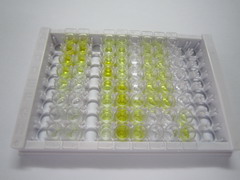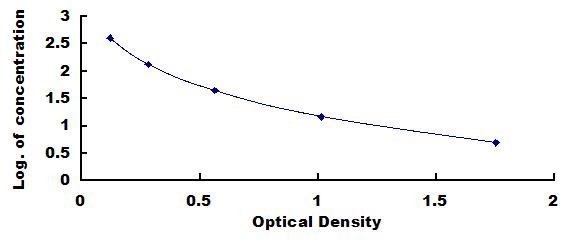Packages (Simulation)

Reagent Preparation

Image (I)
Image (II)
Certificate


ELISA Kit for Gamma-Aminobutyric Acid (gABA)
4-Aminobutyric Acid
- Product No.CEA900Ge
- Organism SpeciesPan-species (General) Same name, Different species.
- Sample Typeserum, plasma, tissue homogenates, cell lysates, cell culture supernates and other biological fluids
- Test MethodCompetitive Inhibition
- Assay Length2h
- Detection Range4.94-400pg/mL
- SensitivityThe minimum detectable dose of this kit is typically less than 2.17pg/mL.
- DownloadInstruction Manual
- UOM 48T96T 96T*5 96T*10 96T*100
- FOB
US$ 471
US$ 673
US$ 3029
US$ 5722
US$ 47124
For more details, please contact local distributors!
Specificity
This assay has high sensitivity and excellent specificity for detection of Gamma-Aminobutyric Acid (gABA).
No significant cross-reactivity or interference between Gamma-Aminobutyric Acid (gABA) and analogues was observed.
Recovery
Matrices listed below were spiked with certain level of Gamma-Aminobutyric Acid (gABA) and the recovery rates were calculated by comparing the measured value to the expected amount of Gamma-Aminobutyric Acid (gABA) in samples.
| Matrix | Recovery range (%) | Average(%) |
| serum(n=5) | 91-99 | 95 |
| EDTA plasma(n=5) | 79-101 | 96 |
| heparin plasma(n=5) | 99-105 | 102 |
Precision
Intra-assay Precision (Precision within an assay): 3 samples with low, middle and high level Gamma-Aminobutyric Acid (gABA) were tested 20 times on one plate, respectively.
Inter-assay Precision (Precision between assays): 3 samples with low, middle and high level Gamma-Aminobutyric Acid (gABA) were tested on 3 different plates, 8 replicates in each plate.
CV(%) = SD/meanX100
Intra-Assay: CV<10%
Inter-Assay: CV<12%
Linearity
The linearity of the kit was assayed by testing samples spiked with appropriate concentration of Gamma-Aminobutyric Acid (gABA) and their serial dilutions. The results were demonstrated by the percentage of calculated concentration to the expected.
| Sample | 1:2 | 1:4 | 1:8 | 1:16 |
| serum(n=5) | 97-104% | 78-95% | 79-98% | 94-103% |
| EDTA plasma(n=5) | 87-95% | 90-98% | 80-91% | 80-95% |
| heparin plasma(n=5) | 83-102% | 91-98% | 95-102% | 95-102% |
Stability
The stability of kit is determined by the loss rate of activity. The loss rate of this kit is less than 5% within the expiration date under appropriate storage condition.
To minimize extra influence on the performance, operation procedures and lab conditions, especially room temperature, air humidity, incubator temperature should be strictly controlled. It is also strongly suggested that the whole assay is performed by the same operator from the beginning to the end.
Reagents and materials provided
| Reagents | Quantity | Reagents | Quantity |
| Pre-coated, ready to use 96-well strip plate | 1 | Plate sealer for 96 wells | 4 |
| Standard | 2 | Standard Diluent | 1×20mL |
| Detection Reagent A | 1 | Assay Diluent A | 1×12mL |
| Detection Reagent B | 1×120µL | Assay Diluent B | 1×12mL |
| Reagent Diluent | 1×300µL | Stop Solution | 1×6mL |
| TMB Substrate | 1×9mL | Instruction manual | 1 |
| Wash Buffer (30 × concentrate) | 1×20mL |
Assay procedure summary
1. Prepare all reagents, samples and standards;
2. Add 50µL standard or sample to each well.
And then add 50µL prepared Detection Reagent A immediately.
Shake and mix. Incubate 1 hour at 37°C;
3. Aspirate and wash 3 times;
4. Add 100µL prepared Detection Reagent B. Incubate 30 minutes at 37°C;
5. Aspirate and wash 5 times;
6. Add 90µL Substrate Solution. Incubate 10-20 minutes at 37°C;
7. Add 50µL Stop Solution. Read at 450 nm immediately.
GIVEAWAYS
INCREMENT SERVICES
| Magazine | Citations |
| Toxicology and Industrial Health | Effect of sub-acute exposure to acrylamide on GABAergic neurons and astrocytes in weaning rat cerebellum PubMed: 21444355 |
| Neurosci Lett | Expression of the neuron-specific potassium chloride cotransporter KCC2 in adult rat cochlear. PubMed: 18577424 |
| Biomark Insights | Decreased Epidermal Growth Factor (EGF) Associated with HMGB1 and Increased Hyperactivity in Children with Autism PubMed: PMC3623607 |
| Biomarker insights | Correlation Between Hepatocyte Growth Factor (HGF) and Gamma-Aminobutyric Acid (GABA) Plasma Levels in Autistic Children PubMed: PMC3694825 |
| Biomarker insights | Decreased Hepatocyte Growth Factor (HGF) and Gamma Aminobutyric Acid (GABA) in Individuals with Obsessive-Compulsive Disorder (OCD) PubMed: PMC3762604 |
| Scientific Reports | Renal Denervation Improves the Baroreflex and GABA System in Chronic Kidney Disease-induced Hypertension pubmed:27917928 |
| Journal of Neuroscience | Sex differences in the glutamate signaling pathway in juvenile rats Pubmed:28861894 |
| Scientific Reports | A novel homozygous mutation in GAD1 gene described in a schizophrenic patient impairs activity and dimerization of GAD67 enzyme Pubmed: 30341396 |
| Neurochemical Research | Aucubin Alleviates Seizures Activity in Li-Pilocarpine-Induced Epileptic Mice: Involvement of Inhibition of Neuroinflammation and Regulation of Neurotransmission Pubmed: 30666488 |
| Neuroscience Letters | Differentiation of human glioblastoma U87 cells into cholinergic neuron Pubmed: 30928478 |
| Neurochemical Journal | Glutamate Signaling Defects in Propionic Acid Orally Administered to Juvenile Rats as an Experimental Animal Model of Autism |
| Effect of gamma radiation on combination therapy of certain antiepileptic drugs in rats. | |
| Experimental and Therapeutic Medicine | Antiepileptic effects of exogenous β‑hydroxybutyrate on kainic acid‑induced epilepsy Pubmed: 33101467 |
| Exp Anim | Dementia model mice exhibited improvements of neuropsychiatric symptoms as well as cognitive dysfunction with neural cell transplantation 33828024 |
| Neurogenetics | Age-dependent neurological phenotypes in a mouse model of PRRT2-related diseases 34101060 |
| Sci Rep | Overexpression of wild-type human amyloid precursor protein alters GABAergic transmission 34475508 |
| J Food Biochem | Adaptogenic potential of ginsenosides against domoic acid‐induced toxicity by regulating neuronal stress and kinate receptors: Ex vivo and in silico studies Pubmed:35102569 |
| Catalog No. | Related products for research use of Pan-species (General) Organism species | Applications (RESEARCH USE ONLY!) |
| CPA900Ge11 | BSA Conjugated Gamma-Aminobutyric Acid (gABA) | Immunogen; SDS-PAGE; WB. |
| CPA900Ge21 | OVA Conjugated Gamma-Aminobutyric Acid (gABA) | Immunogen; SDS-PAGE; WB. |
| CPA900Ge41 | HSA Conjugated Gamma-Aminobutyric Acid (gABA) | Immunogen; SDS-PAGE; WB. |
| PAA900Ge01 | Polyclonal Antibody to Gamma-Aminobutyric Acid (gABA) | ELISA, CLIA. / IHC-Fr, ICC, IP (predicted). |
| PAA900Ge02 | Polyclonal Antibody to Gamma-Aminobutyric Acid (gABA) | ELISA, CLIA. / IHC-Fr, ICC, IP (predicted). |
| LAA900Ge71 | Biotin-Linked Polyclonal Antibody to Gamma-Aminobutyric Acid (gABA) | WB; IHC; ICC. |
| LAA900Ge81 | FITC-Linked Polyclonal Antibody to Gamma-Aminobutyric Acid (gABA) | WB; IHC; ICC; IF. |
| CEA900Ge | ELISA Kit for Gamma-Aminobutyric Acid (gABA) | Enzyme-linked immunosorbent assay for Antigen Detection. |
| AEA900Ge | ELISA Kit for Anti-Gamma-Aminobutyric Acid Antibody (Anti-gABA) | Enzyme-linked immunosorbent assay for Antibody Detection. |
| LMA900Ge | Multiplex Assay Kit for Gamma-Aminobutyric Acid (gABA) ,etc. by FLIA (Flow Luminescence Immunoassay) | FLIA Kit for Antigen Detection. |
| KSA900Ge11 | ELISA Kit DIY Materials for Gamma-Aminobutyric Acid (gABA) | Main materials for "Do It (ELISA Kit) Yourself". |









